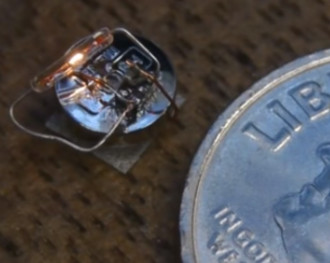The year is drawing to a close, and we have a weekend project for you to while away the remaining hours. Take the Coin Cell Challenge!
The point of the challenge is to do something interesting with a coin cell. That’s it! It’s a challenge that can be as simple or as involved as you want. Low power is where it’s at these days, so if you’ve never used the hardware sleep modes in your favorite microcontroller, that would make an excellent challenge entry. Show us what you’re able to do with short wake periods, and talk about when and why that wake happens. Or go a completely different route and build your own cell!

One of our biggest inspirations for this contest was [Ben Krasnow] who managed to squeeze enough juice out of a miniscule coin cell to power his Flashing Light Prize entry, only because he reduced internal resistance by heating the cell with an air gun (here’s the Hackaday coverage of that project). And [Elliot Williams] wrote a great guide on what kind of juice you can expect to get out of a cell. Take these to heart and do something interesting this weekend. Enter now!
















Squeezing juice out from a cell by heating it up. That’s awesome.
The energy density of a humble 2032 cell is pretty good. Not quite rocket fuel grade, but it’s up there.
So, silly thought experiment: Can you make a rocket powered by coin cells? Suck the energy from a cell and use that to accelerate the depleted cell out the back. What is the performance relative to actual rockets?
From the spec sheet, a 2032 cell can yield 210 mAh at 2-3 V, or 420-630 mWh. In more convenient units, call it near enough 2 kJ. Expressed in kinetic energy of the 3.2 gram cell being thrown out the aft end, that’s 1118 m/s exhaust velocity.
Dividing by g (9.8 m/s/s) to get the usual (if irrational) units for specific impulse Isp, and saying we can do it with a 90% efficiency (hey, if Tesla can do it, so can I), then we get a coin-cell powered rocket with an Isp of 108 seconds.
So, compared to a space shuttle booster Isp of 242 s, it’s bad. Compared to the SpaceX Raptor engine’s Isp of 363 s it’s atrocious.
But can it get to orbit?
To orbit from earth needs a kick of around 9000 m/s. If you’ve got an exhaust velocity of 108*9.8 m/s, then the mass ratio you need, given by the rocket equation, exp(deltaV/exhaustV), is 4843:1.
So, to launch 1 kg into orbit, you need 4.8 tons of coil cells, assuming your packaging and electronics and accelerating hardware has zero mass…
So, coin cells probably won’t make it to orbit. Better stick with the cow farts Elon is using for his Raptor.
But the fact a coin cell contains enough energy to accelerate itself to 3 times the speed of sound is itself pretty cool.
Coin cell gun!
Yeah, coin cells have relatively poor energy densities, at least when compared with chemical fuels. According to Wikipedia (not the best source, but the values should be good enough), a kg of lithium batteries (coin cells) constitutes 1.8 MJ, compared to 42.8 MJ from a kg of kerosene, a popular fuel for the early days of rockets. Taking into account a stochiometric ratio of about 4 kg oxygen for every 1 kg of kerosene, and the practical energy density of a kerosene and oxygen is about 8.6. This is still about 4.75 times the energy density of a pile of coin cells. So yeah, no coin cell rockets any time soon.
On a happier note, coin cells still exceed the energy density of Lithium Ion and Polymer batteries that are clawing their way up to 1 MJ/kg energy densities. At least they aren’t supercapacitors, which are apparently beat out by a spinning wheel in terms of energy density.
Either way, a suprising amount of energy for an electrochemical cell.
was it poptronics or radio electronics that used a cell, paper clip, nail polish and an LED to make a light up fishing lure? I tried to make one once, even though I don’t fish.
You can squeeze more power out of an almost dead coin cell by squeezing it: https://gasstationwithoutpumps.wordpress.com/2016/12/25/coin-cell-batteries-are-pressure-sensitive/